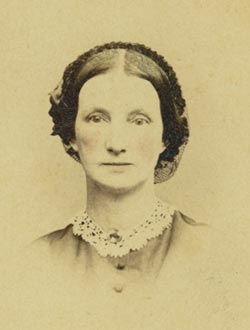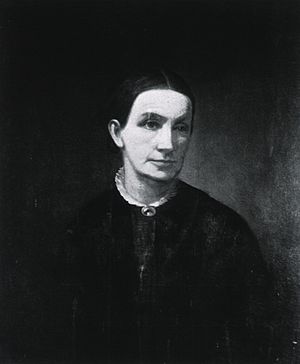Ann Preston facts for kids
Quick facts for kids
Ann Preston
|
|
|---|---|

Ann Preston, c. 1867
|
|
| Born | December 1, 1813 West Grove, Pennsylvania, United States
|
| Died | April 18, 1872 (aged 58) |
| Occupation | Doctor, activist, educator |
Ann Preston (December 1, 1813 – April 18, 1872) was an American doctor, activist, and teacher. She was a pioneer for women in medicine. Ann Preston was the first woman to become the dean of a medical school. This was the Woman's Medical College of Pennsylvania (WMCP). It was the first medical school in the world created only for women.
Contents
Ann Preston's Early Life and Education
Ann Preston was born in 1813 in West Grove, Pennsylvania. This town is near Philadelphia. Her parents were Amos and Margaret Smith Preston. Her father was a successful farmer and a Quaker. Quakers are a religious group known for their peaceful beliefs.
Ann was one of eight children. She went to a local Quaker school. Later, she briefly attended a Quaker boarding school. Her family's farm was a safe place for people escaping slavery. This shows her family's strong beliefs against slavery.
As the oldest daughter, Ann often cared for her family. Her mother was frequently ill. This meant Ann's formal schooling was sometimes interrupted. However, she continued to learn on her own. She attended lectures and joined a local literary group. She also became active in movements for social change. These included groups working against slavery and for women's rights.
How Ann Preston Became a Doctor
Once her younger siblings were older, Ann Preston worked as a schoolteacher. In 1849, she wrote a children's book called Cousin Ann's Stories. In the 1840s, she became very interested in women's health. She taught classes for women about hygiene and how their bodies worked.
From 1847 to 1849, she studied medicine privately. She learned from Dr. Nathaniel Moseley. At that time, most medical schools did not accept women. So, Ann Preston could not get into them.
In 1850, at age 38, she joined the first class at the Female Medical College of Pennsylvania. This school was founded by Quakers. She wrote to a friend about her excitement. She said she felt "restful in spirit and well satisfied."
She graduated in 1851. She was one of eight women to earn a medical degree that year. The next year, she returned for more studies. In 1853, she became a professor there. She taught about how the body works and staying healthy.
Founding a Hospital and Facing Challenges
In 1862, Ann Preston helped start the Woman's Hospital of Philadelphia. This hospital was very important. It gave students at the college a place to get hands-on training. This was something they badly needed.
During the American Civil War, the college closed for a year. Ann Preston herself became very ill during this time. She suffered from a serious illness called rheumatic fever. She also felt a lot of stress and exhaustion. She spent three months recovering in a hospital.
When the college reopened in 1862, it moved into rooms rented from the Woman's Hospital. In 1864, a disagreement happened among the teachers. The dean at the time, Edwin Fussell, tried to stop a student named Mary Putnam Jacobi from graduating. Other teachers, including Dr. Preston, strongly supported Jacobi. After this, Fussell resigned. Ann Preston then became the dean of the college in 1866. She held this important role until 1872.
Ann Preston's Impact as Dean
As the first woman dean of a medical school, Ann Preston fought for women's rights to become doctors. She was a true "institution builder." She helped the college grow and rebuild after the war. She was known as a "fighting Quaker." She used her strong beliefs and words to make changes.
Besides the hospital she founded, she also opened a nursing school. She kept pushing for better learning chances for her female students. This included getting them more and better hands-on experience in hospitals.
Standing Up for Women Doctors
In 1867, the local medical society in Philadelphia objected to women practicing medicine. Ann Preston spoke out strongly against this. She said, "we must protest...against the injustice which places difficulties in our way...because we are women." Her strong words helped calm much of the criticism.
In 1868, Preston made a deal with Philadelphia's Blockley Hospital. This allowed students from the Woman's Medical College to attend clinics there. In 1869, she made a similar deal with the Pennsylvania Hospital.
However, in November 1869, something difficult happened. A group of about thirty female medical students faced harassment. Male medical students yelled at them and threw things. One student recalled, "the [male] students rushed in pell-mell, stood up in the seats, hooted, called us names and threw spitballs." This incident led to big public discussions. But in the end, it helped make it normal and accepted for both male and female students to attend clinics together.
Ann Preston's Later Life and Legacy
Besides her work as dean, Dr. Preston also practiced medicine. She worked at the Woman's Hospital and had her own private practice. She never married. She had a full and active life with friends and her work. She continued to write and work for social improvements.
In 1871, she became ill with a severe form of rheumatism. This left her weakened. She had another illness the next year and passed away on April 18, 1872.
Ann Preston's work opened doors for countless women in medicine. She showed great courage and determination.
Ann Preston's Achievements
- First woman dean of the Woman's Medical College of Pennsylvania
Images for kids
See also
 In Spanish: Ann Preston para niños
In Spanish: Ann Preston para niños
 | DeHart Hubbard |
 | Wilma Rudolph |
 | Jesse Owens |
 | Jackie Joyner-Kersee |
 | Major Taylor |




